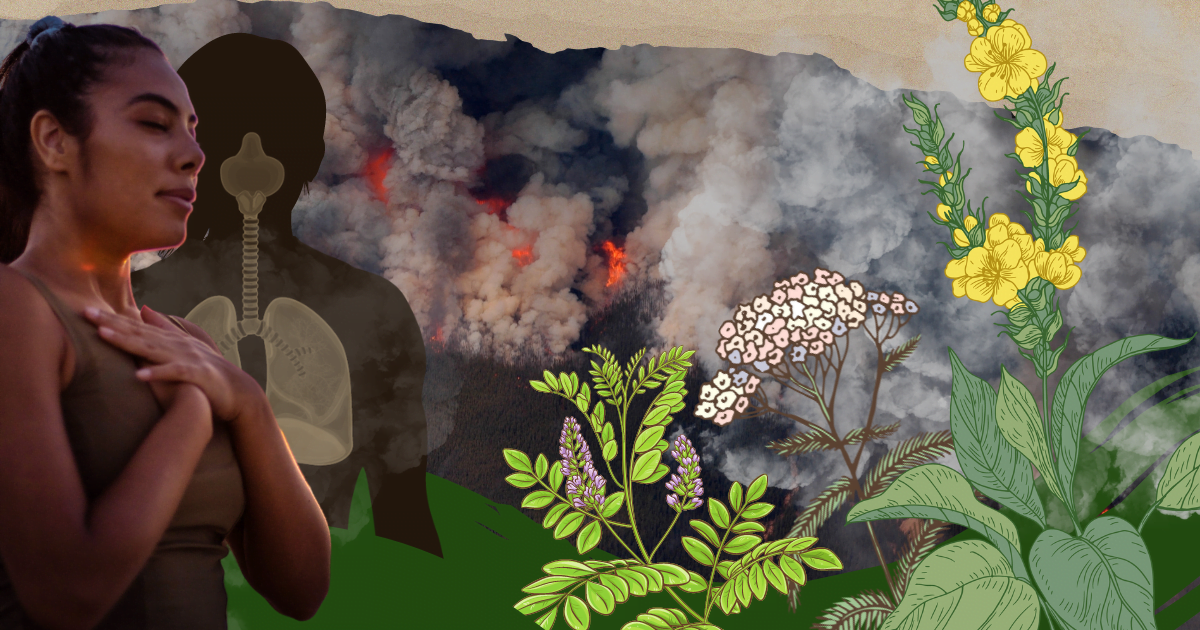As I write this, I have returned from visiting Hartford, CT with my family. We met so many kind people while we were there. Among those were folks at the Niles Street Community Garden (Clark and Henry) and the folks at Westmoor Park, where they grow food for local soup kitchens and senior centers through a partnership with Plant a Row for the Hungry. I worry for their health and safety. Times like these I turn to our plant relatives with humble requests that they provide their gifts of medicine to those in need.
While we are extremely fortunate to have winds from the southwest bringing moisture (rain) and pushing most of the smoke into the Atlantic, particulates in north Florida have increased to moderate levels and I do recommend folks wear an N95 mask outdoors, close windows, and cycle air filters, if they have them. Children, elders, pregnant individuals, the immunocompromised, and people with allergies, pulmonary and cardiovascular conditions, and asthma are most at risk. That being said, smoke and particulates can affect healthy people too.
Mild symptoms can include headaches, sinus and eye irritation, and fatigue. More serious symptoms can include labored breathing, asthma attacks, irritated respiratory airways and lungs, coughing, and chest pain. To be honest, we thought we were just experiencing normal allergies while we were there.
As we know, climate change has been a key factor in increasing the risk and severity of wildfires and other climate disasters globally, such as Florida’s hurricanes. Climate change creates warmer, drier conditions that encourage both wildfires and stronger hurricanes. The losses this causes are innumerable. The 2020 wildfire season was the deadliest and most destructive on record for California. Hurricanes are also three times more frequent than 100 years ago and the severity of those (those classified as a Category 3 or higher) has doubled since 1980, according to the Environmental Defense Fund. The earth is inflamed and she’s speaking to us.
Licorice
(Glycyrrhiza glabra)
Licorice is a wonderful accompaniment to any lung and respiratory tea blend because one of its active ingredients, glycyrrhizic acid, adds a sweetness that counteracts the strong bitter flavors of many other helpful herbs that people hate taking. It is also what makes it antioxidant, anti-inflammatory, and antimicrobial.1It has a long history of use for lung function support, respiratory strengthening, and the promotion of healthy mucous membranes.
The main part used is the root of the plant. Short-term, food-like amounts are considered safe but it is contraindicated in high doses because it can increase the stress hormone cortisol, have a negative effect the development of babies’ brains in utero, and can interact with a number of prescription medicines.2 It is also recommended that children under 50lbs do not use it. Contrary to popular belief, most licorice-flavored candies actually use anise because it is cheaper.
People on the following medications should take extra care:
- Blood pressure
- Blood thinners
- Cholesterol, including statins
- Diuretics (water pills)
- Estrogen-based contraceptives
- Nonsteroidal anti-inflammatory drugs (NSAIDs)
Dosage (tea):1 Tablespoon licorice root for every 1 cup of boiled water. Cover and let sit for 10‒15 minutes, then strain.You won’t need to sweeten tea that uses licorice root as it contains more sweetness than sugar.
Kids who are over 50lbs can drink ⅓ cup up to 3 times a day and adults can drink 1 cup, 2-3 times a day (both short term). The World Health Organization (WHO) and European Scientific Committee of Food (SCF) both recommend limiting glycyrrhizin intake to no more than 100 mg per day.
Mullein
(Verbascum thapsus)
Flowers, leaves, and roots can all be used medicinally. As covered in our allergies guide, I particularly recommend the leaves for the lungs. The fresh or dried leaves can be used as a tea supporting pulmonary and respiratory function. This is our go-to herb for allergy season, cold season, and lung first aid. The active compounds of mullein include saponins, flavanoids, phenylethanoid, and iridoids which give it its anti-inflammatory, pain relieving, antioxidant, antiviral, and antitumor properties.3
There are no known contraindications for mullein other than people with contact skin allergies.
Dosage (tea): 1–2 teaspoons of flowers daily per 1 cup of boiled water and/or 15 to 30 mL of fresh leaf or 2 to 3 g of dry leaf. Cover and let sit for 10‒15 minutes, then strain. Drink up to four times daily.
Nettle
(Urtica dioica)
Another one of our allergy herbs, nettle is highly nutritive. It contains vitamins a, C, K, several B vitamins, calcium, iron, magnesium, phosphorus, potassium, sodium, and more. Its components make it helpful in supporting the body’s inflammatory response, which, in turn, can contribute to better lung, sinus, and upper respiratory health. The main parts used for medicine are its leaves and flowers.
There are few side effects, but if harvesting you want to be careful of the hair-like barbs that can cause rashes, bumps, and hives in allergic people. It is contraindicated for pregnant women because it can stimulate uterine contractions (miscarriage risk).4
Like licorice, nettle can also interact with medications for certain conditions:
- Blood thinners
- Blood pressure
- Diuretics (water pills)
- Diabetes
- Lithium
Dosing (tea): 1-2 teaspoons of herb per 1 cup of boiling water. Cover and let sit for 10‒15 minutes, then strain. Drink up to four times daily.
Oregano
(Origanum vulgare)
As we’ve covered in the past, its volatile oils work together to support your body’s natural resistance to harmful foreign substances that can lead to respiratory issues. The carvacrol and rosmarinic acid found in its essential oil are both believed to be natural decongestants and antihistamines. It is used for respiratory conditions such as asthma, bronchitis, and coughs. Carvacrol is also found in thyme (Thymus vulgaris) & wild bergamot (Citrus aurantium bergamia). Rosmarinic acid is also found in lemon balm (Melissa officinalis), rosemary (Rosmarinus officinalis, Salvia rosmarinus), sage (Salvia officinalis), thyme (Thymus vulgaris), and peppermint (Mentha × piperita).
This is a common plant used in cuisine that isn’t contraindicated in herbal form. In rare cases it can cause stomach upset in large quantities.
Concentrated oregano, particularly in essential oil form, can interact with medications for certain conditions:
- Blood thinners
- Diabetes
- Lithium
- Nonsteroidal anti-inflammatory drugs (NSAIDs)
Dosage (tea): 2 teaspoons of herb per 1 cup of boiling water. Cover and let it sit for 2-4 minutes, then strain. Drink up to 4 times daily.
Oregano, thyme, and rosemary are steam tent favorites. Also see, rosemary and violet.
Plantain
(Plantago major/P. rugelii/Plantago lanceolata)
It contains natural mucilage and has moist cooling properties, including the ability to support mucous membrane health by soothing irritation. It is best known for its topical applications but can also be used internally. The leaves and seeds are both edible and have been used medicinally for centuries.5 The leaves contain anti-inflammatory compounds.6
Generally safe, plantain can cause mild symptoms of nausea, vomiting, diarrhea, bloating, and skin reactions for some people. This is sometimes a sign of allergy or intolerance but it may also be a result of its laxative properties (particularly the seeds). It is often used for gastrointestinal complaints and a support for digestive health.
Dosage (tea): 1/2 teaspoon of herb per 1 cup of boiling water. Cover and let it sit for 10 minutes, then strain. Drink 3-6 times daily.
Yarrow
(Achillea millefolium)
Used externally for wounds, it can also support lung and respiratory health internally in tea by easing pain and inflammation. Every part of the plant can be used but it is best to use aerial parts and allow roots to be well established. The flower is what I find most helpful for pain management.7 The most common natural flower color found is white, but it comes in different colors and they are all medicinal.
Yarrow is considered safe in food-like amounts. It may increase urine and cause some drowsiness. It is contraindicated for pregnant and breast-feeding individuals because it can bring on menstruation and/or cause miscarriage. It can also slow blood clotting. People allergic to ragweed may also have an allergic reaction.
As a result, yarrow can interact with medications for certain conditions:
- Antacids (pills for reducing stomach acid)
- Blood thinners
- Diuretics
- Lithium
- Nonsteroidal anti-inflammatory drugs (NSAIDs)
- Sedatives (sleep pills)
Dosage (tea): 1 teaspoon of herb per 1 cup of boiling water. Cover and let it sit for 10 minutes, then strain. Drink up to 3 times daily.
Other Resources
Sources

